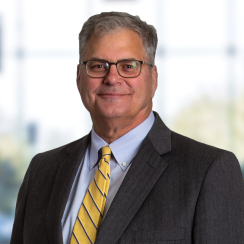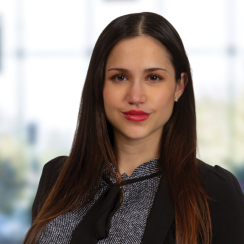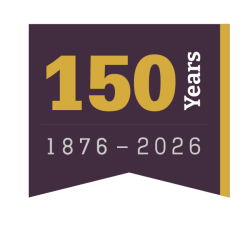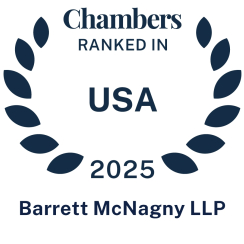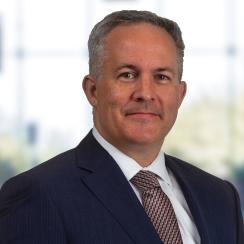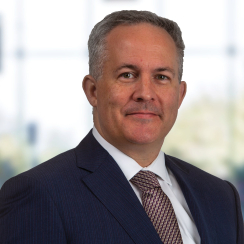Attorneys Recognized in 2026 Indiana Super Lawyers Publication
Barrett McNagny LLP is proud to announce its listing in Indiana Super Lawyers for 2026.
Read More Fitzharris Selected Fellow of the Litigation Counsel of America
Kevin K. Fitzharris of Barrett McNagny LLP has been selected as a Fellow of the Litigation Counsel of America.
Read More Understanding UCCJEA Jurisdiction in Custody and Parenting Time Cases
Learn how the UCCJEA determines which state has jurisdiction in child custody cases and why it matters for parents navigating custody or parenting time disputes.
Read More Cohen Elected Chair of the Executive Committee
H. Joseph Cohen has been elected to serve as the Chair of the firm's Executive Committee for 2026. He will serve alongside Mark Bains, George Pappas, William Ramsey and Jeffrey Woenker.
Read More Schreiber Elected Partner
Sarah L. Schreiber, a member of the labor and employment team, was elected Partner effective January 1, 2026.
Read More 2025 National Labor Relations Act Updates: Key Developments and Implications
Learn about the updates and key developments of the National Labor Relations Board and what employers should do.
Read More Nuevo Joins Labor & Employment Team
Stephanie Nuevo has joined the firm and will focus her practice in the areas of litigation and labor & employment law.
Read More Barrett McNagny LLP Listed in 2026 “Best Law Firms” Rankings
Barrett McNagny LLP is proud to announce that the firm was ranked in the 2026 “Best Law Firms” rankings by U.S. News Media Group and Best Lawyers®.
Read More What’s Yours is Mine: Understanding Adverse Possession in Indiana
Learn how Indiana's adverse possession laws allow long-term occupants to gain legal ownership of land, even when "possession is nine-tenths of the law" doesn't apply.
Read More Bender Joins Litigation Team
We are proud to announce that David P. Bender has joined the firm as an associate on the litigation team.
Read More Fitzharris Elected to Board of Governors
Kevin K. Fitzharris has been elected to a 2-year term on the Indiana State Bar Association (ISBA) Board of Governors, the governing body for the Association.
Read More Geist Joins Family Law Team
Barrett McNagny LLP is pleased to announce that Kayte Geist has joined the firm. Ms. Geist will focus her practice in the family law area.
Read More Barrett McNagny Recognized in the Chambers USA 2025 Guide
Barrett McNagny LLP is proud to announce that is has been recognized in the Chambers USA 2025 Guide in the area of Corporate/M&A. Barrett McNagny is the only firm listed with an exclusive presence in northeast Indiana.
Read More Potential Changes to Home Healthcare Third-Party Providers Overtime Obligations
The U.S. Department of Labor’s (DOL) Wage and Hour Division (WHD) recently issued a proposed rule that would substantially reduce overtime obligations for third-party home healthcare providers.
Read More Talarico Named Alumnus of the Year
Sam Talarico has been named Alumnus of the Year by Bishop Dwenger High School as part of their 2025 Hall of Fame Inductess.
Read More Attorneys Listed in The 2026 Best Lawyers in America: Ones to Watch
Barrett McNagny LLP is proud to announce that seven firm attorneys who were selected by their peers for inclusion in The 2026 Best Lawyers in America®: Ones to Watch in their respective practice areas.
Read More Attorneys Recognized in The Best Lawyers in America 2026
Barrett McNagny LLP is proud to announce the following 25 firm attorneys were selected by their peers for inclusion in The Best Lawyers in America® 2026 in their respective practice areas
Read More Creating an Effective Employee Handbook: A Comprehensive Guide
Discover essential tips for creating an effective employee handbook that fosters workplace culture and provides legal protection for your business.
Read More Documents at Hiring and Form I-9 Audits
Essential guide to Form I-9 compliance, audit preparation, and federal penalties. HR professionals' complete resource for employment verification.
Read More Laws Governing Service & Emotional Support Animals in the Workplace
Learn when employees can bring emotional support animals to work under ADA laws. Essential guide for employers on workplace accommodation requirements.
Read More Browse Categories
- Alternative Dispute Resolution
- Appellate Law
- Bankruptcy and Creditors' Rights Law
- Business and Corporate Law
- Cybersecurity
- Economic Development Financing
- Employee Benefits Law
- Estate Planning & Administration
- Family Law
- Health Care Law
- Intellectual Property Law
- Labor and Employment Law
- Litigation
- News
- Real Estate Law
- Securities Law
- Seminars and Workshops




